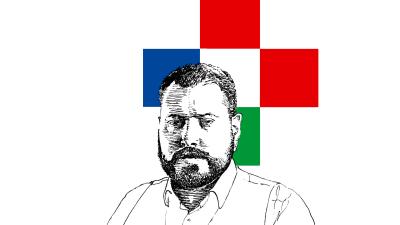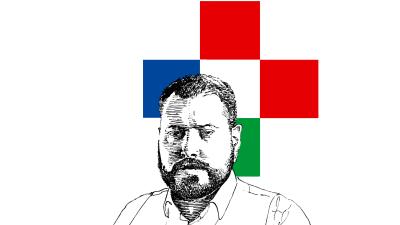October 2021. In the Carmelite cloister, on the heights of Buda, Viktor Orbán receives journalists close to Fidesz for an off-the-record discussion. Everyone is worried about the union of six opposition parties and their newly elected primary candidate, Péter Márki-Zay, who looks like a threat for the spring 2022 elections. But from his terrace overlooking Pest and the Parliament, Viktor Orbán is not worried about the next election. " 2022 ? No problem. It's 2026 that will be a challenge..."
An easy re-election...
And indeed, 2022 was not to be a difficult election for Orbán. Soon, the united opposition candidate, the progressive liberal Péter Márki-Zay, showed his limits. A good candidate for a local election in 2018, his lack of experience and his American-style communication - he spent five years in North America and is close to the US Democrats - as well as the disunity within the left-wing coalition, did not allow him to be up to the task of a national election, despite the support of the entire western progressive bloc and all Hungarian opposition media.
The beginning of the war in Ukraine at the end of February sounded the death knell for the Left's campaign. The communication was hesitant, haphazard, contradictory and unconvincing. It was felt that the lack of information, the difficulty of coordination within the coalition and the shaky organisation of the campaign team prevented Márki-Zay from being heard and found convincing. On the other hand, Orbán adapted his campaign overnight, and all his troops were in unison. This is because Fidesz has an efficient communication apparatus and disciplined troops made up of veterans of many successful election campaigns over the past fifteen years.
The campaign posters were replaced at the beginning of March: Orbán appears in a chest shot, in a black military-style jacket, visibly on the ground with his gaze focused in the distance and confident. The poster reads "Let's preserve Hungary's peace and security". The tone is set, without hesitation. The communication of the party members was then completely reoriented towards securing the Hungarian minority in Ukraine, the preservation of national interests, especially in the field of energy, and the desire to keep Hungary and Hungarians out of any armed conflict.
On the left, the leader of the United Opposition's staunch Atlanticism is pushing to the opposite direction. "If NATO sends soldiers, we should send some too", "For young people, blood is more important than oil": phrases that were very badly perceived by the Hungarian public, worried about the return of war to its borders after just 20 years and the Yugoslav wars.
The gap between Viktor Orbán, clothed in the aura of a protector of peace and the fatherland, and Márki-Zay, who appears more and more, as his coalition members give up and stab him in the back, as the intended victim of an inevitable defeat, is dramatically widening.
On 3 April 2022, the left-wing coalition that six months earlier had seen itself as the ultimate weapon to dethrone Viktator suffered a resounding defeat. Together, the six opposition parties lost about 900,000 votes compared to their combined score in 2018. Orbán triumphed and won two-thirds of the parliament for the fourth time in a row.
...but a difficult year
Described as a xenophobic country because of its opposition to massive illegal immigration from outside Europe, Hungary has not been troubled by the massive influx of refugees from Ukraine. Though one million of them fled to Hungary by the end of 2022, this was hardly noticed by the Hungarians who do not live near railway stations. On the one hand, only a few tens of thousands of Ukrainian citizens remained in Hungary; on the other hand, those were mainly true refugees. Women, children and the elderly made up the bulk of the asylum seekers. Their polite, patient, grateful and respectful attitude to local rules allowed both the authorities and the associations to organise their reception perfectly, with the general approval of the Hungarian population.
No, it was not the massive influx of refugees that posed a problem for Viktor Orbán in 2022.
After two years of covidist madness, in which the Hungarian government took part - admittedly, without zeal - dealing a very heavy blow to the country's monetary reserves that were used to mitigate the effects of externally imposed sabotage of the economy, Hungary is once again exsanguinated after a decade of economic recovery and remarkable growth.
In 2018, Orbán had publicly spoken of an imminent arrival of a major economic crisis. As a result, he tried to prepare Hungary for such tsunami. But while Hungary is making a lot of political noise, its economic reality is much more modest than its international image.
The diversification of partnerships sought by Viktor Orbán to reduce Western domination of the Hungarian economy has suffered a terrible setback with the sanctions against Russia. In 2022, the national currency, the forint, experienced a disconcerting inflation. In January, the exchange rate with the euro was €1 for 355 Ft, and the fall accelerated to €1 for 430 Ft in mid-October, before slightly improving at the end of the year to the level of €1 for 400 Ft.
Although he belongs to the liberal school, Viktor Orbán is nonetheless a skilful politician who knows his electorate well. In mid-January, in order to fight the threat of inflation he announced imposing price freezes on some basic products (sugar, wheat flour, sunflower oil, pork leg, chicken carcass and cow milk). This comes just a few months after a freeze on petrol prices for private cars with Hungarian plates.
In the summer, the KATA self-employment system - created by Orbán ten years earlier to clean up the economy - was liquidated without any preparation for public opinion and to the surprise even of members of Fidesz, Viktor Orbán's party. An ominous sign. In the autumn, the ministries were ordered not to spend any more money on anything other than salaries.
Finally, the real blow came in the summer as well: with the upheaval in energy prices following the European sanctions against Russia, Orbán was forced to partially abandon his programme to reduce gas and electricity prices. A key measure of his 2010-2014 mandate, Hungarian individuals benefited from particularly low gas and electricity prices, with the state covering part of the cost. From now on, a threshold is set up to which the preferential rates are applied. Beyond that, the market price is applied...
The start of the new school year in September was therefore gloomy. Added to this was the announcement that the school holidays would be shifted to limit the presence of children in the schools during the coldest times of the year... in order to save on heating costs. The teachers then launched a series of protests, demonstrations multiplied and a strike was even launched. It must be said that with inflation, their particularly low salaries were becoming untenable.
The government backed down and announced significant wage increases over the coming years. The first increase of 10% was announced for the end of 2022, and should be followed by others, more important, in the future... but the money is running out while the national education will have to spend literally ten times more on heating this winter.
With food inflation approaching 50% over the year, and much more for some products (new price freezes were announced in the autumn for eggs and potatoes), everyone is starting to worry as shops that have survived covidism start to close.
In this context, EU money is needed. However, although it is due to Hungary, the EU is withholding it to put pressure on Hungarian politics. This wrestling has been going on for more than a year, and some political sacrifices will have to be conceded in order to get these EU-subsidies. This also partly explains Orbán's strategy of blocking as many anti-Russian and pro-Ukrainian measures as possible, so that he in turn has some good cards to play and a chance to negotiate. The Polish government, in a similar situation in many respects, but which also fears for its re-election in the autumn of 2023, is giving up much more to the EU, and indeed, in Hungary, there is a fear of being isolated and at the mercy of Brussels should Poland default.
Meanwhile, while the left-wing opposition has collapsed and is totally demoralised, another danger is looming for Orbán: the nationalists of Mi Hazánk, a party that grew out of the historic Jobbik channel - now a pro-EU populist party - are close to 10%. Having just entered parliament in 2022, notably thanks to their frontal opposition to covidist measures, they avoid systematic attacks and voluntarily adopt a constructive criticism approach, knowing how to support the government in votes on certain subjects while drawing attention to the government's contradictions and compromises on other subjects. All this is combined with skilful handling of social networks where some of their videos are watched by 12% of the national population.
For Orbán, 2023 will not be easy.
Read also
The Trap of Legal Immigration
Since 2015, immigration has become a major issue in Central Europe where, since the fall of Soviet communism, it was rather emigration that was the main social phenomenon. However, since the famous "migrant crisis" along the Balkan route, a lot has changed. And the faces you see in the streets of Warsaw, Budapest, Prague and Bratislava are changing too.
Ferenc Almássy
Is the end of private cars coming soon?
For better or worse, the car has revolutionised our way of life, drastically changing our relationship with space. I do not intend to take stock of this revolution here and now.
Ferenc Almássy
What to remember from Viktor Orbán's State of the Nation Address?
Every year in mid-February, Viktor Orbán holds a major speech to take stock of the past year and announce the main lines of the coming year, while highlighting the main elements of his vision and strategy.










Comments (0)